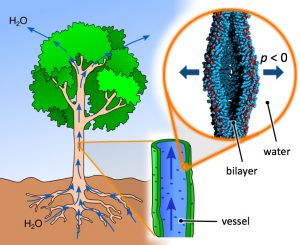| What limits the ability of plants to take up water from dry soil? That is the question Matej Kanduč and his international research collaborators asked in an effort to solve the mystery of how plants suck water from the driest soil. Plants pump water under negative pressures, which reach the values up -100 bar. So far, it has be unknown what is the limiting factor for this value. Using atomistic simulations and model calculations, the research team has found out that this is apparently due to the so-called lipid aggregates that are contained in the plant sap. In their publication in Proceedings of the National Academy of Sciences, they showed that the aggregates lead to the formation of growing cavities in the water column if the negative pressure is too strong. The limited suction power affects how plants can get water from drying soil, and with that, in how dry environments plants can grow. |  |

